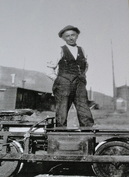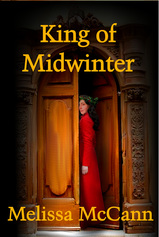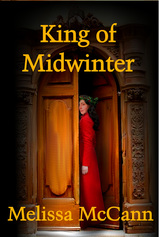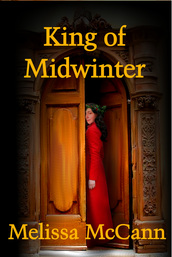 Jacob Jaconovich on a small Gerry
Jacob Jaconovich on a small Gerry “I still remember the day after the emperor set fire to my portion of the city as if it were yesterday” – Philippe Rouseff on the occasion of his ninetieth birthday.
***
I took my wife to Mass more to please her than from any desire of my own. I watched as the priest lifted the loaf and intoned the words, “On the night in which he was betrayed…” Bile rose up in my throat at the words. I knew betrayal.
The Emperor, one of my closest associates--a cousin even, had struck at the heart my railroad operation in an effort to destroy my family business. I pressed my lips together to stifle the urge to cry out in anger as the priest held up the cup. When Christ was betrayed, only one man died. I wondered how many thousands burned when I was betrayed.
As the faithful shuffled forward to take their bread and sip from the cup, I shifted in my seat and pondered why that bastard crime boss, Wu, a better man than my cousin, had sent his wife to my offices to warn one of the bookkeepers about the impending purge. As the bookkeeper raced from the building, she screamed, “Fire! The army is coming! Fire! Flee!” Who else had been warned that the emperor’s army marched against the city? Who had time to flee?
I had no desire to spend a Sunday afternoon working, but at three in the afternoon, I met with two railroad supervisors to survey the damage to almost a square kilometer of the city. I expected to find tall burned skeletons of tenement buildings. Nothing remained but stone foundations and ash. The emperor had been thorough.
We drove up to the deserted M’TK station. Blowing ash shifted and settled after the passage of my car. My stomach churned wondering how many of my employees’ ashes mixed and blew among the debris of burned buildings.
The brick and slate train station still huddled beside the tracks the lone survivor in a wasteland. Soot now stained the red bricks the same black as the rest of the borough. We stood and looked over the desolation—nothing moved, nothing lived. I wanted to hope that some of my people survived, but hope refused to kindle here among the ruins. The workers were only indigenous northerners, laborers, but they stocked my warehouses and loaded my trains.
The Central Region supervisor looked up. “What the hell?”
I followed his eyes and soon made out a string of boxcars pulled by the station’s yard-gerry slowly rolling toward the station. Filled with the horror that lay around me, I stared transfixed at the approaching apparition. If I were a superstitious man, I’d have turned and fled in fear of death and ghosts. I refused to take my eyes off of this small sign of life.
When the gerry with it’s string of boxcars towering above it, rolled to a stop at the station, the operator dressed in railroad coveralls lifted a woman down from the first boxcar. A young boy about ten jumped to the ground. This family appeared to be like any other of the northern poor—dirty and ragged.
The man introduced himself as the assistant stationmaster. He unlocked the station for us and assured us that he had locked the station’s ticket money in the safe. He seemed respectful enough. He kept his eyes lowered as custom dictated for a man of his station.
I heard the eagerness in my voice, “Have you seen signs that some of my people survived?”
“I haven’t seen anybody within a kilometer of the station. Wu warned me, so I had time to move the equipment. I suppose others had time.”
I shook off my melancholy for a moment. “Listen, you saved my equipment and the money in the station. I must give you a reward. What do you want?”
The man answered immediately. “The Stationmaster ran away when he heard about the army. I stayed long enough to save your equipment. Give me the stationmaster’s job and let me live here with my family.” For the first time, the man looked me in the eye. The sharp intelligence I saw in the eyes of a northerner surprised me. The man’s humility returned when he asked for help to assist his cousin from the train.
Curious about the new stationmaster, I helped lift his cousin in a wheelchair from the boxcar. I almost recoiled from the reek that still clung to the air inside the car. I recognized the stench that is created when many unwashed bodies are packed close together. I picked up a small piece of waste paper flecked with fish scales. The evidence before my eyes and nose told me that many people, probably northerners with their love of fish, had very recently been packed into this car. In my mind, I saw people filling the boxcars to flee from the fire. I suspected that my new stationmaster had his own reasons for his secrecy, but the knowledge that some of my workers had survived revived a hope that settled into my heart.
I turned to the humble man beside me and forgot a lifetime of lessons about the indigenous people from the north. I suddenly saw not a worthless, northern laborer but a man created in the image of God. I saw the man who had saved my people, a man of honor and compassion. I wondered if he thought of me as just an oppressive Southerner.
How did laborers see the elite? Did they think all of us are as cruel and evil, as I now saw my cousin the emperor to be? I reached out to shake the stationmaster’s hand, fearful for the first time in my life of being rejected. –
***
This story is told from the perspective of the young boy mentioned here in the book M’TK Sewer Rat: End of an Empire. This is the first record of Mr. Rouseff’s side of the story of the day he met his longtime friend Jacob Jaconovich then the assistant stationmaster.
http://www.amazon.com/MTK-Sewer-Rat-Empire-ebook/dp/B00APRA4NG



 RSS Feed
RSS Feed